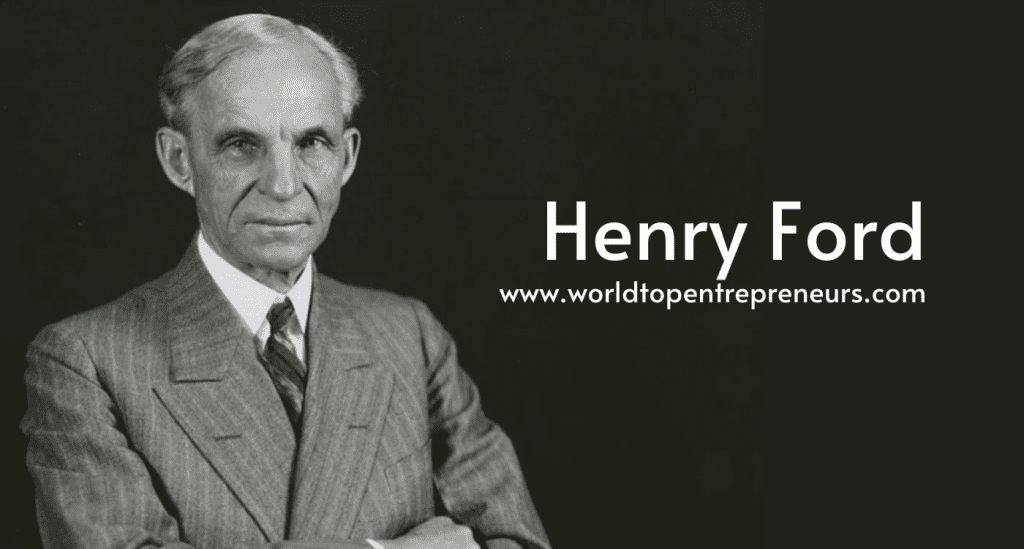In the annals of industrial history, few names resonate as profoundly as Henry Ford. Born on July 30, 1863, in Dearborn, Michigan, Henry Ford would go on to revolutionize the automotive industry and leave an indelible mark on the world of manufacturing and innovation. His journey from humble beginnings to becoming a titan of industry is not just a story of entrepreneurial success but a testament to perseverance, ingenuity, and a relentless drive to change the world.
Early Life and Influences
Henry Ford’s upbringing was rooted in the rural landscapes of Michigan, where he spent his formative years on his family’s farm. His fascination with machinery and mechanics became apparent early on, as he tinkered with tools and engines, driven by an insatiable curiosity about how things worked. This innate curiosity would shape his future endeavors and lay the groundwork for his pioneering innovations in the automotive industry.
Despite showing promise in engineering and mechanics, Ford’s path to success was not straightforward. He faced setbacks and challenges along the way, including financial struggles and initial failures in business ventures. However, these experiences served as valuable lessons, fostering in him a resilience that would later define his approach to entrepreneurship.
The Birth of an Iconic Brand
In 1903, Henry Ford co-founded the Ford Motor Company, a pivotal moment that would alter the course of industrial history. Ford’s vision was ambitious yet straightforward: to make automobiles affordable and accessible to the average American. This vision was crystallized with the introduction of the Model T in 1908, a revolutionary vehicle that would become synonymous with innovation and mass production.
Central to Ford’s success was his implementation of the assembly line production system, a concept that transformed manufacturing processes worldwide. By breaking down complex tasks into simpler, specialized steps, Ford not only increased efficiency but also drastically reduced production costs. This breakthrough not only made the Model T affordable for the average American family but also set a new standard for industrial productivity and efficiency.
Impact on Society and Culture
The advent of the automobile era ushered in by Henry Ford’s innovations had profound implications for society and culture. Beyond mere transportation, the automobile became a symbol of freedom, mobility, and progress. It reshaped urban landscapes, spurred economic growth, and catalyzed the development of industries ranging from oil production to road construction.
Ford’s commitment to innovation extended beyond the realm of manufacturing. In 1914, he famously introduced the concept of a five-dollar workday for his employees, doubling the prevailing wage at the time. This bold move was not just an act of corporate generosity but a strategic decision aimed at fostering a loyal and motivated workforce. By paying higher wages, Ford sought to attract skilled workers, reduce turnover, and create a consumer base capable of purchasing the very products they helped manufacture.
Visionary Leadership and Legacy
Henry Ford’s impact transcended the automotive industry, encompassing broader social and cultural spheres. His advocacy for technological advancement and industrial innovation laid the foundation for America’s rise as a global industrial powerhouse in the 20th century. Beyond his contributions to manufacturing, Ford’s legacy endures through his philanthropic efforts and educational initiatives aimed at empowering future generations.
Ford’s leadership style was characterized by a blend of pragmatism, innovation, and a deep-seated belief in the power of American ingenuity. He was known for his hands-on approach to management, often spending time on the factory floor alongside his employees, gaining firsthand insights into production processes and fostering a culture of continuous improvement.
Challenges and Controversies
Despite his visionary achievements, Henry Ford’s legacy is not without controversy. His staunch opposition to labor unions and controversial views on issues such as antisemitism have drawn criticism and scrutiny. Ford’s involvement in politics and his publication of anti-Semitic literature in the early 20th century continue to tarnish his reputation, highlighting the complexities of his personal beliefs and public persona.
The Ford Legacy Today
Today, the Ford Motor Company stands as a testament to Henry Ford’s enduring legacy. From its humble beginnings in a small Detroit workshop to its status as a global automotive powerhouse, the company continues to innovate and evolve in a rapidly changing industry. Ford’s commitment to sustainability, technological advancement, and community engagement underscores its ongoing relevance in the 21st century. Beyond the realm of business, Henry Ford’s contributions to society continue to resonate. His philanthropic endeavors, including the establishment of the Ford Foundation, have had a lasting impact on education, healthcare, and social welfare initiatives worldwide. The Henry Ford Museum of American Innovation stands as a tribute to his pioneering spirit, celebrating the achievements of not just one man but an entire era of American innovation.
Conclusion
Henry Ford’s life and legacy epitomize the spirit of American entrepreneurship and innovation. From revolutionizing manufacturing processes to making automobiles affordable for millions, Ford’s impact on industry, society, and culture remains profound. His story is a testament to the power of perseverance, ingenuity, and a relentless pursuit of progress.
As we reflect on Henry Ford’s legacy, we are reminded that his vision and determination continue to inspire future generations of innovators and entrepreneurs. His journey from a young farm boy with a passion for machinery to a global industrial icon serves as a timeless reminder of what can be achieved through creativity, hard work, and a steadfast commitment to making a difference in the world.





















